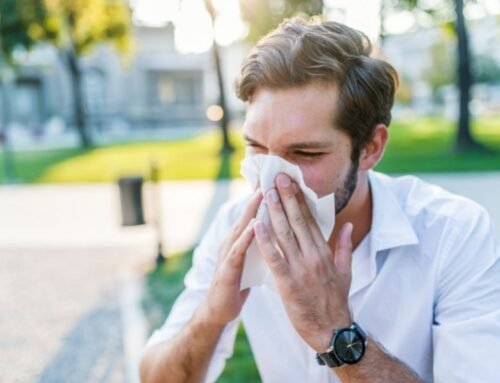Urticaria (Hives) can occur at any age, we can encounter throughout life; They are puffy, itchy, fading skin lesions with a red print around. Urticaria (Hives) in adults may be due to many reasons, it should be kept in mind that drug and food allergies may be among these reasons. It is recommended to diagnose and treat as a result of the necessary tests by allergists.
Urticaria, which can appear from childhood, can be seen for many reasons. It can happen in childhood and adulthood for different reasons. Urticaria is red on the surface of the skin, ranging in size from a few millimeters to a few centimeters, often in the form of pale, itchy plaques and one of the important features is that this picture usually fades within 24-48 hours and disappears without leaving a trace on the skin.
The duration of urticaria is extremely important in diagnosis and treatment. If the skin rashes due to urticaria lasts less than six weeks, it is defined as acute urticaria. If these urticarial skin rashes last longer than 6 weeks, they are defined as chronic urticaria.
In adults, urticaria (hives) can sometimes be alone, but sometimes it can be accompanied by angioedema. Urticaria is a very common skin reaction. The risk of occurrence in humans at any time in life ranges between 15-25%. We are likely to have an attack of urticaria throughout our life. Especially acute urticaria is more common in young adults and children. Chronic urticaria is less common (1%) and is more common in adults and women.
What are the Symptoms?
Patients say that they have a complaint of itching and redness on the body, which they cannot understand, sometimes during the day and sometimes when they wake up, they state that they have an itchy red skin rash on their entire body. Skin rashes, which we define as acute urticaria, occur spontaneously and may disappear spontaneously.
Some of the people with urticaria rash say that they have itching that they cannot pinpoint exactly, and that typical urticaria lesions appear later. Sometimes they need to photograph this because these skin lesions may disappear spontaneously within half an hour or 1 hour.
How the urticaria occurs is sometimes noticed by the patient. Some physical causes may cause urticaria symptoms, the most common of which are; pressure urticaria or may occur when exertion, sweating, sun exposure, heat and cold. Urticaria can also be affected by psychological factors, and it is seen that urticaria plaques appear more intense in situations of intense stress.
Urticaria should be considered if there is a swollen, itchy, red, pale skin rash that lasts more than 24-48 hours on the body, if it spontaneously disappears in one part of the body and then disappears, if it is seen with widespread body itching and also if it is accompanied by swelling in the eyelid and lips.
What Causes Urticaria in Adults?
It has been shown that many causes can be among the causes of urticaria in adults. When we look at the causes of urticaria, it is seen that some of them are due to external factors, some of which are in their allergens, and some of them are due to existing diseases.
When investigating the causes of urticaria, it is important whether it is acute urticaria (Hives) or chronic urticaria. Differentiation of urticaria can change both its causes and treatment.
The most important causes of acute urticaria are drugs, foods and infections.
Acute urticaria, which is more common in childhood, may be related to foods and infections.
In adulthood, among the causes of acute urticaria, food and infections, as well as drugs, have an important place. Acute urticaria can usually subside within 2-3 weeks.
Finding the causes of chronic urticaria can be more difficult. Apart from the causes of acute urticaria in chronic urticaria, it may predispose to urticarial rashes in many diseases.
Among the causes of urticaria, many reasons such as allergens (inhalation, contact, foods), transfusion reactions, infections (bacterial fungal viral helminthic) Insect bites, rheumatic collagen tissue diseases, Malignant diseases (tumors) autoimmune diseases (Hashimoto’s thyroiditis) can be listed.
Food Allergies
Food allergies have an important place among the causes of urticaria. Food itself can cause urticarial rashes after food in childhood or adulthood, as well as food additives in the food.
In particular, urticaria that occurs with canned foods with a long shelf life or food dyes and foods containing food preservatives should be investigated in detail.
Urticaria complaints may sometimes be the first complaint as a harbinger of allergic diseases, sometimes they may accompany other allergic diseases. During the course of allergic rhinitis and asthma caused by pollen allergies involving the respiratory tract, urticaria attacks can be seen in patients during the pollen season.
Like pollen allergies, latex allergies can sometimes lead to urticaria attacks. Urticaria plaques may occur from the consumption of latex-containing products or foods that cross-react with latex.
Among the reasons leading to urticaria, it is necessary to pay attention to drugs. Penicillin and cephalosporin group antibiotics are the most common cause of drug-induced urticaria. Urticarial rashes and drug allergies may persist for weeks despite discontinuation of treatment. It is necessary to be careful as cross reactions may develop between penicillin and cephalosporin group antibiotics. It should be kept in mind that antibiotics may cause urticaria complaints and anaphylactic shock in later use.
Aspirin and NSAI drugs, which are among pain medications, are other drug groups that can cause urticaria and angioedema. It is not important that the patient has used the drug many times before in allergic reactions due to drugs. It can lead to urticaria attacks despite using it many times. In particular, patients with urticaria are recommended to stay away from NSAI drug groups as pain relief.
Urticaria (Hives) in adults can occur for many reasons. Among these, hormone treatments or urticarial complaints may increase during menstrual periods.
Depending on the reasons leading to the emergence of chronic urticaria complaints, it can be divided into chronic spontaneous urticaria or chronic inducible urticaria that occurs due to physical reasons.
It is important for physical reasons in the occurrence of urticaria. Among these, environmental factors such as heat, cold, sunlight, water, pressure on the skin, emotional stresses and exercise can cause urticarial skin lesions.
Chronic Inducible Urticaria due to physical causes
- Symptomatic Dermographism
- Delayed pressure urticaria
- Cholinergic urticaria
- Cold urticaria
- Heat urticaria
- Aquagenic urticaria (water-related)
- Solar urticaria (to sunlight)
- It can be divided into vibratory urticaria (due to vibration).
When to See a Doctor for Urticaria
The emergence of urticaria plaques creates fear and anxiety in most people, especially the picture that we define as acute urticaria usually lasts for a few days, sometimes 3-4 weeks and disappears before 6 weeks. Skin lesions fade within 24-48 hours and disappear without leaving a trace on the skin. Urticaria disappears without a permanent scar, but it causes serious problems such as depression as it affects the quality of life of patients very much.
Acute urticaria (Hives) may disappear within more than 6 weeks, but urticaria complaints, especially due to medication or food, may be a harbinger of allergic shock (anaphylaxis) that may occur later. It should be kept in mind that more serious allergic reactions may develop due to repeated intake of foods and medicines. Urticaria complaints may occur first in drug allergies, but later on, when the same drug is taken, more serious allergic reactions may develop. Therefore, it is necessary to diagnose acute urticaria and to reveal the underlying causes.
Urticaria plaques, especially chronic urticaria, can be a harbinger of a pre-existing disease or may occur during the course of the disease. Therefore, urticaria should be cared for and its causes should be investigated.
- If sudden onset urticarial complaints are more than 6 weeks
- If stubborn and continues in the same place for a long time
- If it affects the respiratory tract
Apart from urticaria, (Hives) if there are other complaints such as weakness, fatigue, joint pain, dry skin, they should be investigated in diseases that may be related to internal diseases. It should be examined in detail by experts who receive training in allergy diseases on internal medicine. In particular, autoimmune diseases, rheumatic diseases, infectious diseases such as hepatitis should be investigated.
What To Do When Going To The Doctor For Urticaria?
While everything is progressing normally, most of the patients often say that they start itching, redness on the body in a way that they cannot understand. Although allergens such as food or drugs that cause urticaria complaints are noticed by the patient, they sometimes indicate that they have an itchy red skin rash on their entire body when they wake up. Especially in patients with urticaria complaints lasting more than 6 weeks, the cause of these complaints should be investigated. When investigating the causes of urticaria in adults, the patients’ own observations and history can be extremely important.
Some preparations you need to make before the examination are helpful in determining the causes of urticaria and establishing its treatment. Here are the things you need to do to be ready before the examination;
When the symptoms occurred and how long they lasted can be noted by the patient. Sometimes, foods and medicines can cause complaints in urticaria (Hives) complaints, although they have used many times before.
We should not forget that urticaria, which has many causes, can occur for many reasons, including vitamins, herbal remedies or supplements that we use in our lives but which we think are not important. That’s why we must take note of any product we use.
Before the examination, write down the questions you will ask your doctor so that they are not forgotten during the examination.
Urticaria can sometimes occur at the first sign of the disease or during the course of the disease. That’s why we should definitely tell about our previous diseases and treatments. Sometimes a hypertension drug that we have been using for a long time can cause severe swelling of the throat and lips, and angioedema.
Since urticaria (Hives) may be an underlying allergy, your allergist can perform a skin allergy test for diagnosis. For this reason, it is better to stop using allergy, painkillers and depression medications 1 week before the examination.
Patients who cannot discontinue their medication may change their medication after consulting with the doctor.
Bring your previous test or x-ray results with you.






